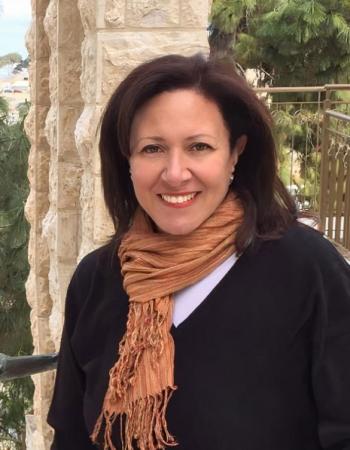
Lisa Agaiby is our Woman of the Week. Patricia met her recently in Melbourne, Australia, where she is the academic dean of St. Athanasius College, a Coptic theological seminary affiliated with Australia’s University of Divinity (and where at least 15 people nominated her as a Woman of the Week). You see her here in the manuscript library at the monastery of St Paul the Hermit in Egypt (the small parchment scroll is an ancient Ethiopic amulet and the large book is a Coptic-Arabic lectionary or liturgical book). Read on, and you’ll see why so many wanted to hear more about her work! We asked her to explain how she got from where she started to her current position at the college:
“I never imagined a life in academia. For twenty years, I worked in marketing and telecommunications—first in Australia, then in the U.S., the U.K., and finally as marketing director for a telecom company in Dubai. My life was business, strategy, and corporate perks.
“Along the way, though, I pursued my passion: Egyptian history. I completed a Master of Arts degree in Egyptology at Macquarie University, simply as a diversion from my day job. I loved it. In fact, after I graduated, I asked the department head whether Coptic language could be offered as part of the Egyptology program. At first, he flatly refused.
“But that same year, Pope Shenouda III visited Australia. I invited the Macquarie faculty to attend one of the youth forums—and they were astonished to see more than 20,000 young Copts gathered with such devotion. The department head was sitting beside me and amazed with what he was witnessing, turned to me and said, “Write me a business case. I’ll not only introduce Coptic—I’ll fight for a whole department of Coptic Studies at Macquarie!”
“Within four months—a miracle in a public university—the proposal was approved unanimously. Soon Macquarie had its own Department of Coptic Studies, the first of its kind in the Southern hemisphere! The Coptic community even partnered with the university to co-fund the position. Commencing in 2004, the Coptic Studies program flourished there for 15 years, until recent funding cuts ended it. But during those years, I completed a Master of Arts in Coptic Studies, just for fun and to support the new program.
“By then, my career and my passion were running in parallel. Then came a turning point. Macquarie announced scholarships for PhDs. I was in my tenth year of working in Dubai—and four years since I had studied at Macquarie—and I was contacted by one of my previous professors encouraging me to apply. I told him I wasn’t interested. He said, “Try anyway.” So I prayed: God, if you want me to return to Sydney, give me this scholarship. If not, close the door. A few months later, I got the scholarship. That was my answer.
“Leaving Dubai, I became a full-time student again after decades in corporate life. It was a huge shift, though I did enjoy all the student discounts!! To my surprise, I ended up with a joint PhD (a cotutelle) between Macquarie and Göttingen University in Germany—two doctorates instead of one. God doesn’t work in halves.
“At first, I planned to return to the corporate world once my doctorate was done. But in my final year, St. Athanasius College in Melbourne contacted me: “We know you’re doing a PhD. Come and teach.” I resisted, but they persisted. I finally agreed to try it—and I fell in love with the students and with teaching. Since 2015, I’ve been with the college, developing courses in desert spirituality, history and hagiography.
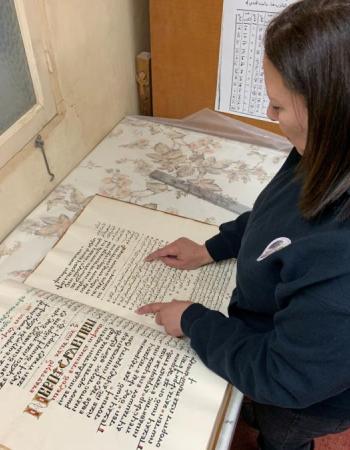
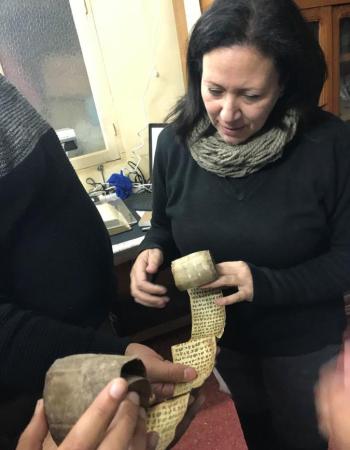
“The contrast with corporate life is staggering. I once worked for money, perks, and lifestyle. Now I work for love, service, and heritage. The rewards aren’t financial—they’re infinitely better. Teaching and preserving my cultural history is an honor and a privilege, not a job.
“Today, our college is part of the University of Divinity, a network of 12 member colleges from different denominations. When I started, nearly all our students were Coptic Orthodox. Now, about half are Protestant, drawn by a hunger to learn about Orthodoxy and early Christianity. Watching their faces light up as they discover traditions we often take for granted, reminds me how special our faith really is.
“I never thought I’d be an academic. But looking back, I see how every step—corporate career, Egyptology, that chance conversation at a papal youth forum—was preparing me for this vocation. What I do now is more than work. It’s a service to my Church, my culture, and to students who are eager to discover the treasures of Orthodoxy.”
Axia!
Our Woman of the Week is Lisa Agaiby, nominated for her work at St. Athanasius Coptic Theological College in Melbourne, Australia. You see her here holding that Coptic-Arabic lectionary, and conferring with the abbot of St. Paul's monastery about the work she and her students are working on. We asked her what she wants you to know about desert spirituality, her area of specialty:
“Over the last few years, I’ve noticed something remarkable: people are deeply drawn to desert spirituality. At our college, we offer many subjects, but anything connected to the desert tradition is like a magnet. And it’s not just here in Australia. Colleagues in the U.S. tell me they see the same interest on their campuses. One of them said, “I think the time is just right for desert spirituality.”
“I agree. In the fast-paced, noisy world we live in, people are searching for something real and grounded. What I find fascinating is that many of today’s “buzzwords”—intermittent fasting, meditation, contemplation, counseling—actually have their roots in desert spirituality.
“When I was growing up in Australia, fasting made me stand out. I’d tell my school friends I was eating only vegan food during Lent, or that our church sometimes encouraged fasting until noon or even 3 p.m. They thought it was bizarre. Yet today, those very practices are mainstream. Veganism, intermittent fasting, meditation, silent retreats, long walks in nature—things once dismissed as strange are now embraced as healthy and life-giving. And they all echo back to the desert.
“That’s why the sayings of the Desert Fathers and Mothers, written nearly 2,000 years ago, still resonate so powerfully today. They speak into our modern restlessness with wisdom that feels timeless.
“My own journey into desert spirituality has also been a journey into preserving its heritage. During my PhD research, I was given access to the manuscript library at the Monastery of St. Paul the Hermit at the Red Sea in Egypt. What I found there was astonishing: an entire room of manuscripts—about 1,300 in total—with no catalogue and no digitization. The doors to that library had not been opened since 1930, when Thomas Whittemore visited on behalf of the Byzantine Institute of America.
“After years of building trust with the Monastery head, I was granted permission to return with students from my college to begin the work of cataloguing and digitizing the collection. We’ve been working there since 2018. The manuscripts, ranging from the 10th to the 20th century, are in Coptic, Greek, Syriac, Ge‘ez, and Arabic, bearing witness to the multicultural life of the monastery over the centuries.
“It has been an incredible blessing—especially as a woman—to be entrusted with this work. The monks and the abbot have been supportive, and the students who come with me absolutely love the experience. For me, it’s not about academic gain, though of course research emerges from it. My first and only priority is preserving cultural heritage—our heritage.
“The work is not without challenges. The manuscripts are stored in an old refectory, a narrow vaulted room without climate control. Some are fragile, even in pieces. We’ve purchased scanners and trained local monks to handle the manuscripts carefully, but ultimately, a proper facility is needed to house the precious collection.
“Funding is also difficult. In Europe or the U.S., projects like this often receive strong financial support. In Australia, manuscript studies and Middle Eastern Christian heritage are still seen as niche, and of little relevance. So most of this work has been self-funded—a labor of love.
“And yet, despite the obstacles, it feels like holy ground. To spend weeks in that monastery, day after day, carefully preserving these treasures, is a gift beyond words. I believe it matters—not just for scholars, but for anyone seeking the deep, steady wisdom that desert spirituality has to offer in our time.”
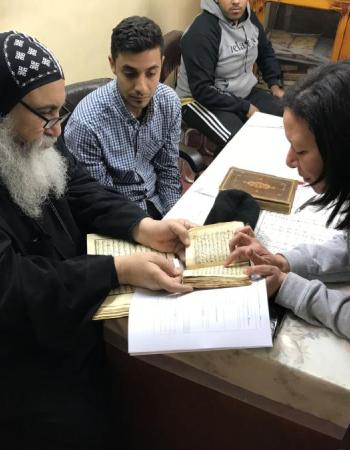
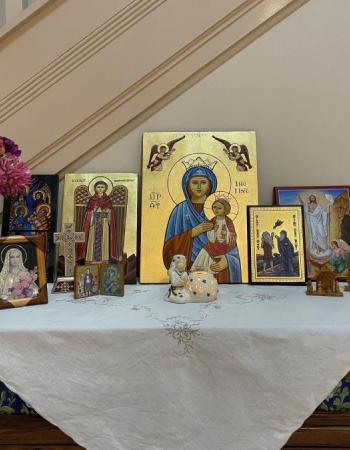
As always, we asked our Woman of the Week, Lisa Agaiby, to tell us about her morning routine. She has also shared her icon stand with you:
“Three things: God, coffee, reformer pilates! I like to begin each morning with God. It’s the only way to get through the day! A short prayer, a couple of psalms and a reading from Scripture. The Coptic Agpeya (Book of Hours) is wonderful because it incorporates all three. At the moment, I’m reading the Book of Acts, which I absolutely love. It’s one of my favorite books of the Bible. Spending that time with Christ before the day begins helps me settle, ground myself, and prepare for whatever challenges the day presents.
“And there’s usually a lot ahead. I work remotely—though the college is based in Melbourne, I live in Sydney. Many of my colleagues are scattered across Australia as well, so our days are filled with Zoom calls and online collaboration. By the time everything wraps up, it’s often close to midnight.
“When I was in the corporate world, I used to imagine academics had it easy. I thought they just strolled into the office a couple of times a week and had a “cruisy” life. At first, I even joked that moving into academia would feel like early retirement. But since becoming an academic, I can honestly say I don’t think I have ever worked so hard in my life! There are no weekends, no real holidays—even conference trips or fieldwork are still work—and every day runs into the next. As much as it’s incredibly rewarding, it’s also very demanding, exhausting work.
“Yet, it is deeply fulfilling. If it weren’t for the love I have for this calling, I don’t think I could have sustained it.
“I usually wake up around 7, and picking up the Agpeya, it’s always the third hour I open up. The psalms of that hour are so beautiful and so inspiring. They have a way of drawing me back into the presence of God, no matter how busy or overwhelming the day becomes.”
Thank you, Lisa!


